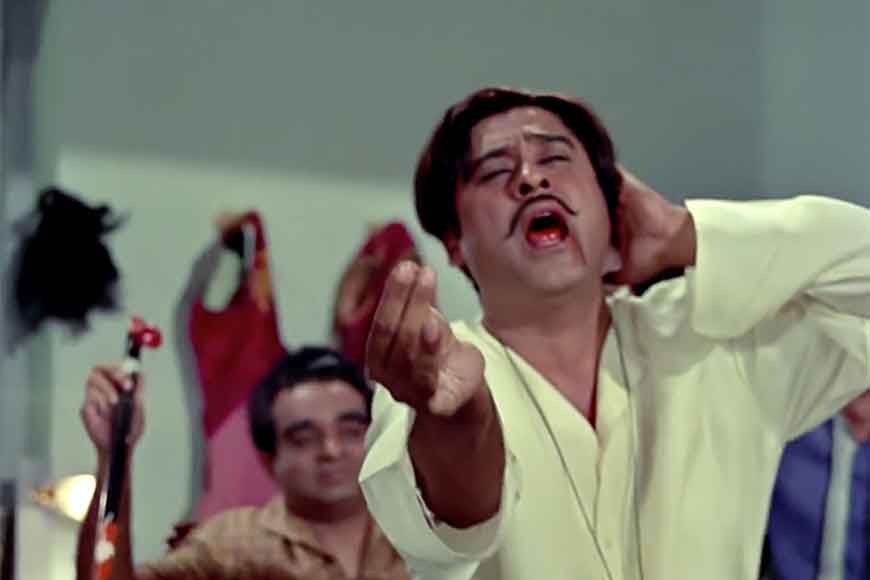Was Kishore Kumar a happy man?

How do we define Kishore Kumar? His larger-than-life entity cannot be fitted in a single frame. He was a genius, a man of myriad moods, an enigmatic, crazy, romantic, brilliant singer/actor nay, a total packaged performer -- in short, God’s precious gift to mankind. He was the last of the super-giants who ruled the music arena. They don’t make his kind anymore. For, who can breathe expression into words like he did, when he opened his lips and sang.
Millions of die-hard Kishore fans, know almost everything about Kishore Kumar, his multi-faceted talent, and how he was instrumental in the success of yesteryear superstars such as Dev Anand, Shashi Kapoor, Rajesh Khanna and Amitabh Bachchan. His deep baritone coupled with mellifluous renditions laden with emotions said everything the on-screen hero wanted to express.
It is tough to believe Kishore Kumar, whose brilliant comic timings on screen could just lift the movie to a different level altogether was in real life a sad man. His appearances in Chalti Ka Naam Gaadi (1958), Jhumroo (1961), Half Ticket (1962), Manmauji (1962), Padosan (1968) and a dozen more films depict the fun and laughter we associate with him. However, in his personal life, he was the most unpredictable man, a prankster – a man-child perhaps who had no qualms about pulling legs of people around him including producers, music directors and even journalists. Bollywood is still rife with incredibly funny stories of his boyish pranks. He once put up a signboard saying ‘Beware of Kishore’ on the door of his Warden Road flat. He reportedly kept shaving off parts of his moustache and hair till he was paid his entire fee by the producer. At the doorstep of his home in Khandwa, Madhya Pradesh, he once put a board saying ‘Mental Hospital’ instead of the family name plate!Once, when a director dragged Kishore Kumar to court for not following his instructions on the sets of a film, the singer decided to take him very seriously. While shooting a scene in which he was driving a car, Kishore Kumar kept driving till he reached Panvel because the director had forgotten to say ‘cut’! He used to call his wives ‘bandariyas’ as they all happened to stay at Bandra or had lived there before! But with this sunny disposition, he concealed well the deep-seated melancholy, the burden of loneliness he carried with him alone.
When he went to Bombay, he wanted to be a singer but his eldest brother, Ashok Kumar was a reigning star of Hindi movies and he persuaded Kishore to try his hands in acting, despite Kishore never being too comfortable in front of the camera. His initial journey was not too smooth. He was duped by many established producers and directors who made him work and then refused to pay. Gradually, he succeeded to come out of his brother’s shadows and establish himself as playback singer. But he was mired in trouble in his personal life. His first wife Ruma Guha Thakurata re-located to Calcutta. Kishore Kumar felt insulted and humiliated, but he was a die-hard romantic yearning for ‘real love’ that seemed to elude him. Next, he fell for Madhubala andthe next nine years were traumatic for the singer, as he saw his lovely wife withering in pain and gradually dying from her debilitating heart condition. He stood by her giving her full support and assurance. However, Kishore Kumar knew the end was nearing and finally, when she breathed her last, he was devastated.
Kishore Kumar was a man of principles and was not afraid to stick to his convictions and faith. He had the gall to confront the ‘Iron Lady’ of India, the then-Prime Minister, Indira Gandhi during Emergency. A prominent member of her Cabinet, V.C Shukla, the then-Union Information & Broadcasting minister, approached Kishore Kumar and asked him to endorse Gandhi’s 20-point programme. He refused to comply. Immediately after that, a ban was imposed on Kishore Kumar’s voice on All India Radio. Regular income tax raids started at his house.
Kishore Kumar hardly ever socialized. By late 1960s, his distrust and contempt for people had become so strong that he began avoiding human contact totally and treating trees as pets, giving each one a name and talking to them. He once had an architect redesign his home into a moat surrounded by water, so people who wanted access to him would at least be psychologically turned off. However, the project did not take off. He would relent if journalists pestered him for interviews, then leave the scene with a regret note. His living room was decorated with weird showpieces like skulls and bones with red lights and sounds backing them up to usher in unwelcome visitors! All these were his way of saying ‘Please leave me alone’. This wasn’t so much madness that surrounded him, it was sadness.









